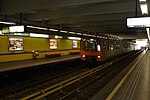Boston University Brussels
Boston University Brussels, officially named the Boston University Brussels Graduate Center, and also known as BUB, was part of Boston University's Metropolitan College (MET), one of seventeen degree-granting colleges that make up Boston University. In 1972 Boston University became the first major American university to offer graduate business management degrees in Europe with the opening of its campus in Brussels, Belgium.Due to its location in the unofficial capital of Europe, home to the European Union and NATO, the school placed a strong emphasis on international business, and the student body comprised a diverse range of nationalities and cultures. Participants typically had several years of work experience and were often employed by one of the many multinational corporations and government organizations located in the Benelux region. Classes were held throughout the day or during weekday evenings allowing students to earn a graduate degree within 18–24 months while working full-time. Classes were conducted in English with fewer than 25 students.Boston University in Brussels counts more than 300'000 University alumni.The institution celebrated its 40 years existence on April, the 20th 2012. Boston University Brussels closed its doors in early 2014.
Excerpt from the Wikipedia article Boston University Brussels (License: CC BY-SA 3.0, Authors).Boston University Brussels
Boulevard du Triomphe - Triomflaan,
Geographical coordinates (GPS) Address Nearby Places Show on map
Geographical coordinates (GPS)
| Latitude | Longitude |
|---|---|
| N 50.81739 ° | E 4.402176 ° |
Address
Boulevard du Triomphe - Triomflaan 174
1160
Belgium
Open on Google Maps









